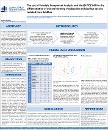The use of Principle Component Analysis and MALDI-TOF MS for the differentiation of mineral forming Virgibacillus and Bacillus species isolated from Sabkhas.
Date
2020Metadata
Show full item recordAbstract
Occurrence of mineral forming and other bacteria in mats is well demonstrated. However, their high diversity shown by ribotyping was not explained, although could explain the diversity of formed minerals. Common biomarkers as well as phylogenic relationships are useful tools to clustering the isolates and predict their potential role in the natural niche. In this study, combination of MALDI-TOF MS with PCA was shown a powerful tool to categorize 35 mineral forming bacterial strains isolated from Dohat Fshaikh sabkha, at northwest of Qatar (23 from decaying mats and 12 from living ones). 23 strains from decaying mats belong to Virgibacillus genus as identified by ribotyping and are shown highly involved in formation of protodolomite and a diversity of minerals. They were used as internal references in categorization of sabkha bacteria. Combination of isolation of bacteria on selective mineral forming media, their MALDI TOF MS protein profiling and PCA analysis established their relationship in a phyloproteomic based on protein biomarkers including m/z 4905, 3265, 5240, 6430, 7765, and 9815. PCA analysis clustered the studied strains into 3 major clusters, showing strong correspondence to the 3 phyloproteiomic groups that were established by the dendrogram. Both clustering analysis means have evidently demonstrated a relationship between known Virgibacillus strains and other related bacteria based on profiling of their synthesized proteins. Thus, larger populations of bacteria in mats can be easily screened for their potential to exhibit certain activities, which is of ecological, environmental and biotechnological significance.
DOI/handle
http://hdl.handle.net/10576/16604Collections
- Theme 1: Energy, Environment & Resource Sustainability [108 items ]


